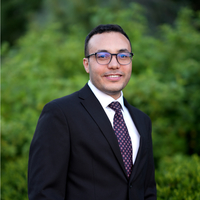- Dar el-Hadith el-Hassania for Higher Islamic Studies, Islamic studies, Graduate Studentadd
- Islamic Studies, English and literature, Islamic studies, Middle East Studies, Religion, Postcolonial Studies, Islamic Law, and 61 moreTheology, Philosophy Of Religion, Religious Studies, History of Religion, Religion and Politics, Colonialism, Anthropology of Religion, Applied Linguistics, Tafsir, Islamic revival and reform movements, Islamic Reformism, Modern Islamic Thought, Teaching Arabic as a Foreign Language (TAFL), Theory of Religion, Religious Pluralism, Method and Theory in the Study of Religion, Jewish - Christian Relations, Abrahamic Religions, Interreligious Dialogue, Comparative Theology, Languages and Linguistics, Qura'an, Ilm al-Kalam, Intellectual History, Sufism, Quranic Studies, Islamic Thought & Philosophy, Islamic Philosophy, Early Islam, Early Islamic History, Arabic Philosophy, Islamic Contemporary Studies, Sociology of islam, Muslims in Europe, Methodologies of jurisprudence usul al-fiqh (أصول الفقه), Medieval History, Islamic History, Biographical Literature of the Prophet Muhammad (Sirah Rasul Allah), Arabian Peninsula in Antiquity, Humanism, Political Theology, Ethics, Mysticism, Arabic Literature, Maghreb studies, Muslim-Christian Relation, Islamic Mysticism, Jewish-Christian-Muslim relations in the Middle Ages, Kalam (Islamic Theology), Salafism, Islamic Theology, Abbasid History, Theology and Religious Studies, International Relations, Philosophy, Sociology of Religion, Epistemology, Neoliberalism, Islam and Secularism, Islamism, and Politics of Middle East & North Africaedit
- I am an intellectual historian of Islamic thought, with a particular focus on Islamic conceptions of religious/worldl... moreI am an intellectual historian of Islamic thought, with a particular focus on Islamic conceptions of religious/worldly differentiation, virtue ethics (at the intersection of philosophy, kalām, and jurisprudence), political thought, tafsīr and Qur'anic studies. My research on the contempoary period examines the dynamics of Islam and the nation-state, the trajectory of Islamism in North Africa, and the transformation of inherited Islamic scholarly traditions in relation to modernity (especially the ulama establishment and its answers to Islamist and secular challenges across the Middle East and North Africa).edit
Research Interests:
Research Interests:
Research Interests:
Research Interests:
This dissertation examines the categories religion (dīn) and the worldly life (dunyā) in premodern Islam, showing how a careful articulation of this differentiation facilitates a comprehensive and renewed understanding of the practical... more
This dissertation examines the categories religion (dīn) and the worldly life (dunyā) in premodern Islam, showing how a careful articulation of this differentiation facilitates a comprehensive and renewed understanding of the practical philosophy of al-Māwardī (d. 450 AH/1058 CE). Scholarship has predominantly framed al-Māwardī as a jurist, a perspective shaped by a prevalent historiography that conceives of revealed religion as the singular normative discourse on ethics and social order in Islam. This approach has produced a one-sided reading of al-Māwardī’s legacy, focusing mostly on one legal work, The Ordinances, while neglecting his contributions in non-juristic fields such as adab-siyāsa (discourse on political prudence and governance). Although recent literature has explored some of his non-juristic writings, the emphasis on jurisprudence continues to underpin the scholarly assessment of al-Māwardī’s thought and the broader study of Islamic political tradition.
Aiming to rectify the fragmented portrayal of al-Māwardī, this dissertation employs linguistic theories, including semantic fields and Bakhtin’s notion of “speech genre,” to trace the development of the dīn/dunyā differentiation in Arabic theological, philosophical, and juristic language from early Islam to the classical Islamic culture (circa. 750–1100 CE). By closely examining al-Māwardī’s thought through the religious/worldly distinction, the dissertation shows how this differentiation functions in key areas of his practical philosophy, thus revealing the connections between his ideas on religion, ethics, politics, and jurisprudence.
In particular, the study demonstrates that al-Māwardī’s thought extends beyond juridical discourse, with the dīn/dunyā differentiation serving as a paradigmatic principle that enables various forms of normativity in his corpus and cultural context. It then introduces the construct of “dunyawī meta-discourse” to parse the worldly discourse on the human condition in al-Māwardī’s works and examine its overlaps with the disciplines of revealed religion. This approach leads to more nuanced interpretations of al-Māwardī’s ethical and political ideas and their place in Arabo-Islamic intellectual history.
By examining the dīn/dunyā differentiation and its continued significance in Arab and Muslim thought, this study contributes to the fields of Arabic and Islamic Studies, Religious Studies, and Political Science, offering new insights into the genealogies and functions of the concept of dīn in Islamic thought.
Aiming to rectify the fragmented portrayal of al-Māwardī, this dissertation employs linguistic theories, including semantic fields and Bakhtin’s notion of “speech genre,” to trace the development of the dīn/dunyā differentiation in Arabic theological, philosophical, and juristic language from early Islam to the classical Islamic culture (circa. 750–1100 CE). By closely examining al-Māwardī’s thought through the religious/worldly distinction, the dissertation shows how this differentiation functions in key areas of his practical philosophy, thus revealing the connections between his ideas on religion, ethics, politics, and jurisprudence.
In particular, the study demonstrates that al-Māwardī’s thought extends beyond juridical discourse, with the dīn/dunyā differentiation serving as a paradigmatic principle that enables various forms of normativity in his corpus and cultural context. It then introduces the construct of “dunyawī meta-discourse” to parse the worldly discourse on the human condition in al-Māwardī’s works and examine its overlaps with the disciplines of revealed religion. This approach leads to more nuanced interpretations of al-Māwardī’s ethical and political ideas and their place in Arabo-Islamic intellectual history.
By examining the dīn/dunyā differentiation and its continued significance in Arab and Muslim thought, this study contributes to the fields of Arabic and Islamic Studies, Religious Studies, and Political Science, offering new insights into the genealogies and functions of the concept of dīn in Islamic thought.
